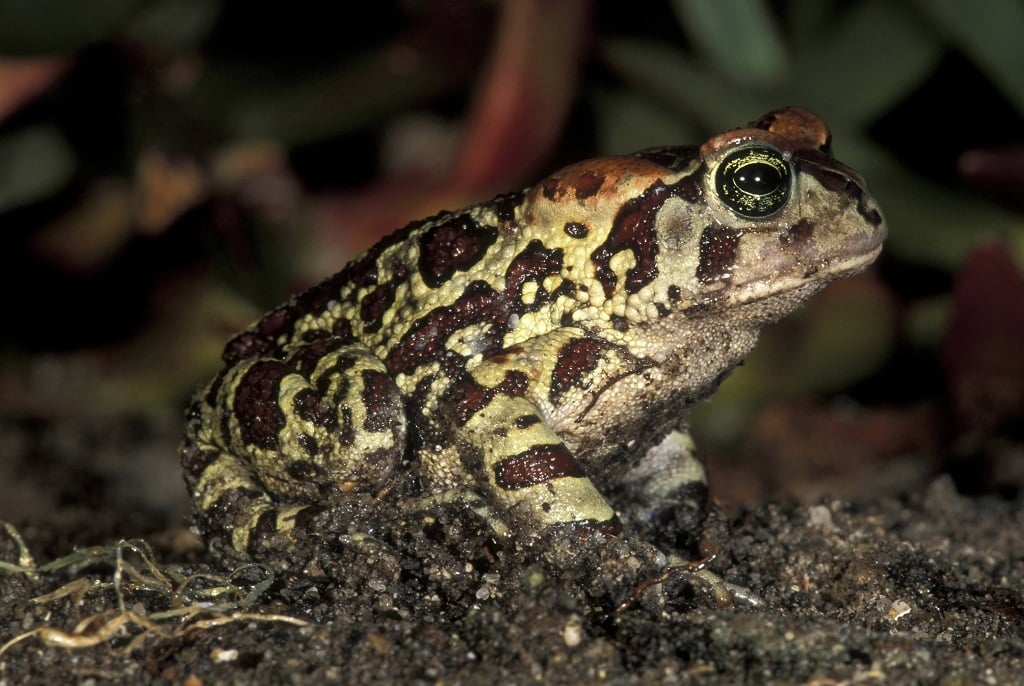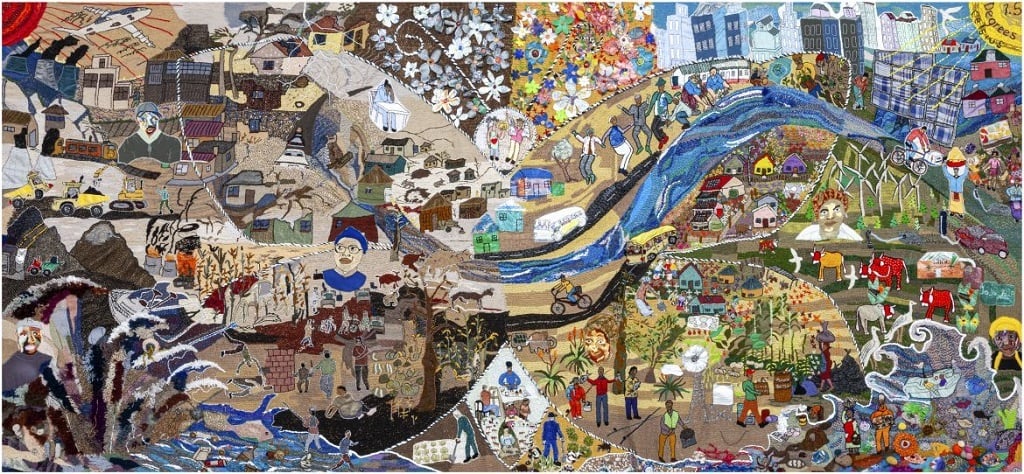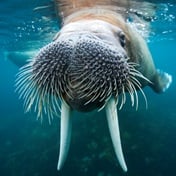
A weekly roundup of climate news and research from around the world.
SA artwork raising awareness of climate impacts on rural communities to be displayed at COP28
An embroidered artwork by some 40 residents of Hamburg, Eastern Cape will be displayed at UN climate summit, COP28.
The artwork, commissioned by the World Wide Fund for Nature (WWF) South Africa, highlights the existential threat climate change poses to human life, especially rural people. The artwork, named Umlibo, is in reference to a sprawling pumpkin vine – a symbol of the need to unite and spread the word about the climate crisis, WWF South Africa said in a statement.
The project was funded by the government of Flanders, a region in Belgium.
"The enormous embroidered artwork is the handiwork of 43 artists, mainly women, who live in the vicinity of the tiny coastal town of Hamburg close to the mouth of the Keiskamma River in the Eastern Cape," WWF South Africa said.
"Umlibo is a masterpiece that brings together science and art in vividly expressing the hardships suffered by vulnerable communities in the context of climate change and their vision and call to action for a more resilient future for the benefit of people and nature," said Craig Smith, senior manager of the marine programme at WWF South Africa.
The artwork will be exhibited at the South African pavilion at COP28. Following the conclusion of the conference, it will be auctioned off, to raise funds for future projects.
Noordhoek residents try to save the Western Leopard Toad
Residents of seaside town Noordhoek, Cape Town, this week had their case heard to block a road development which runs 1.2km though the Noordhoek wetland that is home to the endemic Western Leopard Toad. The case was lodged by the Noordhoek Environmental Action Group (NEAG) against the city of Cape Town and the Western Cape. It concerns a section of Houmoed Avenue known as HAE1.
"The road, HAE1, will disturb not only the wetland, but also three known breeding ponds used by the endangered Western Leopard Toad (WLT) and potentially cause local extinction of the WLT," court documents from NEAG read.
NEAG argues that an expert study by an anuran (frog expert) was not completed and affected the outcome of the environmental authorisation being granted. NEAG also put forward that the public participation process was inadequate.
NEAG wants the decision to grant environmental authorisation for the road section to be reviewed and set aside by the court.
READ | It's 'Toad versus Road' in the Western Cape High Court
Alison Faraday, co-founder of ToadNUTS – a volunteer group focused on saving the WLT and part of NEAG – said that it is key to have an anuran do a proper study to have an evidence-backed determination of the state of the species.
Faraday said that the city may have to go back to the "drawing board" and have a public participation process that includes an assessment by a frog expert.
"The ecosystems that hold us in place as a species are gradually falling apart. We have to protect our green spaces. The Noordhoek wetland needs to be protected," Faraday said.
In its heads of argument, the City of Cape Town indicated that it relied on a faunal expert and wetland ecologist. The experts found that road construction "has the potential to negatively impact" the WLT through habitat loss and degradation, and road mortality. But argued that these impacts could be mitigated. The environmental authorisation was granted on condition that mitigation measures recommended by the experts are followed through.
"We submit that the specialist studies pertaining to the WLT produced credible findings and recommendations and provided a satisfactory basis for the decisions taken[to grant environmental authorisation]…" the city said in its papers. The city also rejected that the public participation process was flawed.
Judgment was reserved.
Eskom unveils game-changing battery energy storage project
Eskom has unveiled a utility-scale battery energy storage project, a first of its kind for the African continent.
The 20MW plant in Worcester, Western Cape, known as the Hex Battery Energy Storage System - can store 100 megawatt hours (MWh) of energy or enough to power Mossel Bay or Howick for up to five hours, according to Eskom.
Some 250 residents from the greater Worcester area were employed during its construction.
The Hex project is part of Phase 1 of Eskom's flagship BESS project. The project is being implemented in two phases and, at completion, will have a total storage capacity of 1 440MWh per day and a 60MW solar PV capacity.
WATCH | Eskom unveils battery storage project - which can power a small town for up to 5 hours
Progress for loss and damage agreement, ahead of COP28
There's been progress toward the establishment of a loss and damage fund – aimed at assisting nations most vulnerable to climate impacts.
Loss and damage results from the impacts of climate change, such as extreme weather events, cannot be avoided. For example, loss of life, displacement of people, damage to infrastructure and shelter.
At COP27, in Sharm el-Sheikh, Egypt, parties agreed that the fund should be set up, and a transitional committee was appointed to define how the fund would work.
Following a two-day meeting in Abu Dhabi last week, parties have now agreed to the recommendations of how the fund should operate. These terms will have to be formally adopted at the next climate summit, COP28, which will be held in the United Arab Emirates from 30 November to 12 December.
The Guardian reported that the fund would be administered by the World Bank and would draw on funding sources from large developing countries and wealthy nations such as the US, UK and EU.
Dr Sultan Al Jaber, the COP28 President, lauded the development, indicating that the transitional committee had "broken deadlocks and found common ground". "Parties must seal the deal in Dubai and fulfil our obligations on the Loss and Damage Fund," he said. If the recommendation is adopted, it will impact "billions of people, lives and livelihoods who are vulnerable to the effects of climate change," he added.
Forestry, Fisheries and Environment Minister Barbara Creecy welcomed the news that an agreement was reached on the way forward for the fund. Creecy said the adoption of the agreement at COP28 is critical and that a target for the funding amount should be at a "scale necessary to respond to the costs and impacts already borne by developing countries."
The projected economic cost for loss and damage by 2030 has been estimated to be between $290- $580 billion in developing countries alone, the Department of Forestry, Fisheries and Environment said in a statement. By 2050, the economic cost for loss and damage in developing countries is estimated to be between $1 trillion to $1.8 trillion, the department added.
The fund will have a board consisting of representatives from both developed and developing countries.
SA Financial Intelligence Unit joins pact to fight wildlife trafficking
South Africa is among the founding signatories to a pact aimed at fighting wildlife trafficking.
The Statement of Principles for a Multilateral Approach to Combating Illegal Wildlife Trade was unveiled by Prince William at the United for Wildlife Global Summit, held in Singapore this week.
United for Wildlife is an organisation focused on the protection of endangered species from wildlife trafficking. It was founded by Prince William and The Royal Foundation in 2014.
United for Wildlife convened the agreement – which encourages international collaboration to detect and prevent financial activity supporting wildlife crime.
"… The financial intelligence units of Australia, Canada, New Zealand, South Africa, Singapore, the United Kingdom, and the United States became the first countries to announce their support for international collaboration to detect and prevent the financial activity that sustains wildlife crime," a statement read.
"The Financial Intelligence Centre South Africa believes that a united front across jurisdictions is required to fight the scourge of IWT (illegal wildlife trade), which has a devastating impact on our precious natural resources and comes with significant human and social capital costs," said Pieter Smit, acting director of SA's Financial Intelligence Centre.
Australia to offer Tuvalu citizens climate refuge
Citizens of the climate-threatened Pacific nation Tuvalu will get "special rights" to live and work in Australia under a landmark treaty unveiled by the two countries on Friday.
Unveiling a compact that includes freedom of movement and defence guarantees, Prime Ministers Anthony Albanese and Kausea Natano said the two nations would work to tackle climate change while preparing for the worst. The treaty would also commit Australia to defend Tuvalu in the case of foreign invasion or natural disaster.
Tuvalu, with a population of just 11 000 people, is among the world's most vulnerable nations due to rising sea levels. Two of Tuvalu's nine atolls have already largely disappeared under the waves, and climate scientists fear the entire archipelago will be entirely uninhabitable within the next 80 years.
Australia's economic reliance on coal and gas exports has long been a point of friction with its many Pacific neighbours, who face massive economic and social costs from wilder weather and rising sea levels. The pact will likely be seen as a significant strategic win for Australia, which is competing with China to cement its influence in the Pacific region. - AFP
Shell sues Greenpeace for $2.1 million after boarding oil vessel
Shell is suing Greenpeace for $2.1 million in damages after the environmental group's activists boarded the company's oil production vessel in transit at sea this year, according to Greenpeace and a document seen by Reuters.
The British oil and gas major filed the claim in London's High Court. Greenpeace activists boarded the vessel in January near the Canary Islands off the Atlantic coast of northern Africa to protest oil drilling and travelled on it as far as Norway.
In an email to Reuters, Shell confirmed legal proceedings were taking place when asked whether it was suing Greenpeace over the incident but declined to comment on the claim amounts.
"The claim is one of the biggest legal threats against the Greenpeace network's ability to campaign in the organisation's more than 50-year history," Greenpeace said in a statement.
Shell and Greenpeace have held negotiations since the case was filed, but talks ended in early November, Greenpeace said, adding it was now waiting for Shell to file further documents in court. Greenpeace said it will then consider its next steps, including ways to stop the case from proceeding. – Reuters
SHOCKING: Shell is suing us and threatening an $8 MILLION damages claim for peacefully protesting their climate destruction.Big Oil is trying to silence us.But we will NOT back down. pic.twitter.com/ROZhjDHhDN
— Greenpeace UK (@GreenpeaceUK) November 9, 2023
US, China reach 'understandings' on climate ahead of COP28 talks, says Kerry
The US and China have reached "understandings and agreements" on climate issues that will help ensure progress is made at the COP28 talks starting late this month in Dubai, US climate envoy John Kerry said.
Kerry met with his Chinese counterpart Xie Zhenhua at Sunnylands, California, this week for four days of talks he described as tough and serious.
"We did come up with some very solid understandings and agreements which will help the COP and will also put us both in a place where we can help the world by focusing on more renewables and other kinds of things," Kerry said at the Bloomberg New Economy Forum in Singapore.
Common ground between the world's two top economies and biggest greenhouse gas emitters is considered a crucial part of any consensus at COP28, which is expected to focus on issues like climate finance and more ambitious energy transition goals. Kerry said details of the agreements between the two would be released soon. – Reuters
Climate scientists don't think governments are doing enough to fight the crisis
Climate Science Breakthrough, a project which focuses on communicating climate science in an accessible way, has released the findings of a survey that compares the perceptions of climate scientists and the general public about the climate crisis.
Possibly obvious, but 86% of surveyed climate scientists think governments are "not doing enough at all" to fight climate change. Other findings indicate that nearly all (98%) of climate scientists support the ban on new oil and gas developments, and 88% of scientists are more pessimistic about the next 20 years than 39% of the public.
See more results here.
NEW #ClimateCrisis SURVEY: 86% of climate scientists think governments are "not doing enough at all", compared to 32% of the UK public. What do scientists know that most people don't? Ummm quite a lot, worryingly!Full results: https://t.co/6nbSmMUObu pic.twitter.com/WjVDLeAHVk
— Climate Science Breakthrough (@ClimateSciBreak) November 8, 2023




 Publications
Publications
 Partners
Partners













